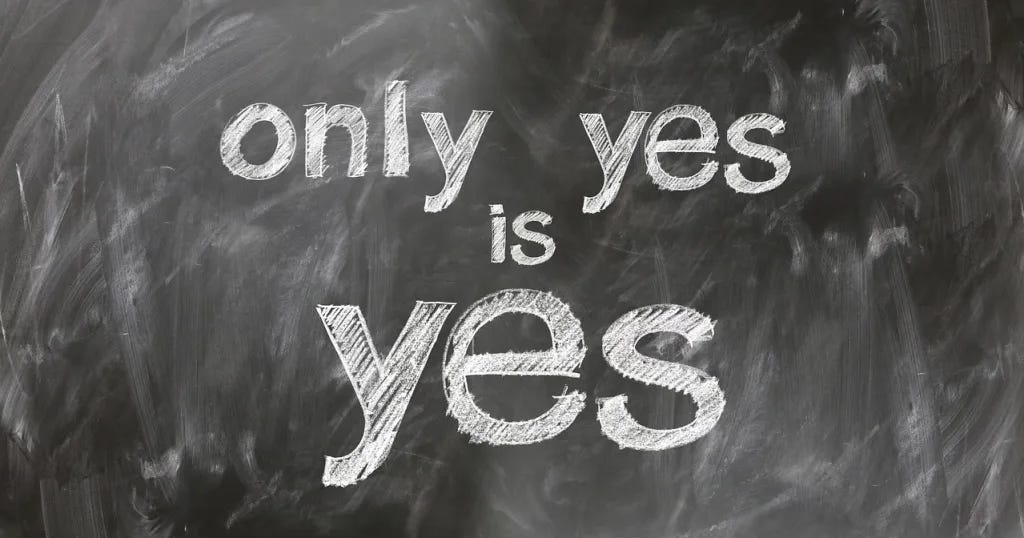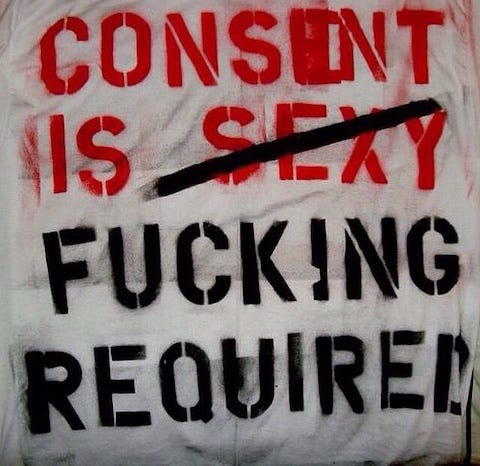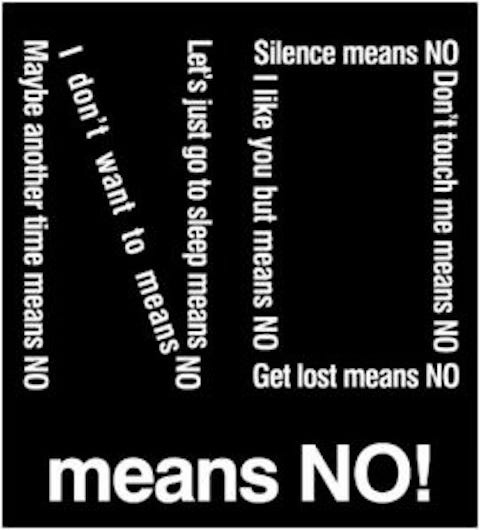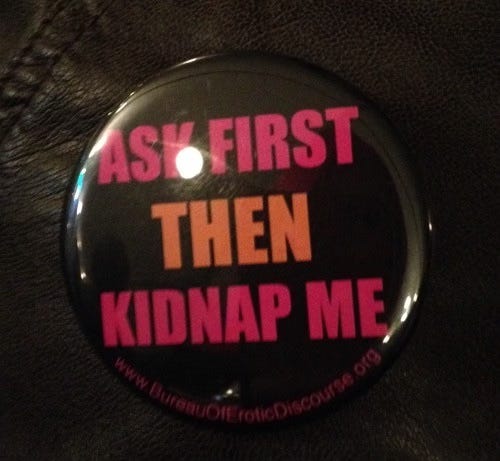Much has been discussed and written about consent already. I don’t intend to comment on any of that, nor get into the movements and social activism around it - not because I don’t think it is important, but because that is not my focus here. Consent is an essential requirement for many things and activities, including (and especially) any type of sexual activity, but it’s still obscured in confusion for many people. Part of the reason for the confusion is that most of us were never taught what consent really means, what it looks like and what it feels like. We were also not taught healthy boundaries, how to check in within ourselves, with our bodies, if something feels right or wrong. Additionally, sex and sexuality is still such a difficult topic to discuss for many people - especially for those living vanilla lifestyle. So, we all sit with our own (subjective) understanding of what consent means. And, as much as we are not intentionally trying to hurt ourselves or others, consent is most often not taken into consideration fully and someone gets hurt in the end. Finally, if we add alcohol and other mind altering substances into the equation - as this is the path people often choose to take in order to feel less anxious and more euphoric, and connect with others sexually - chances are this essential step may be completely overlooked.
One way we can think about consent is to see it as “yes means yes” - which is called the affirmative consent model. This means that “affirmative consent is a knowing, voluntary, and mutual decision among all participants to engage in sexual activity. Consent can be given by words or actions, as long as those words or actions create clear permission regarding willingness to engage in the sexual activity. Silence or lack of resistance, in and of itself, does not demonstrate consent. The definition of consent does not vary based upon a participant's sex, sexual orientation, gender identity, or gender expression.” (source) It could also be added here that consent can be revoked at any time, and that a previous relationship does not constitute (and/or assume) consent. Valid consent needs to be free, informed, and enthusiastic.
If only yes means yes, then we could all agree that no means no, right? Even a soft no - it still means no. It does not mean that one should challenge the other in order to change their response. It means, conversation ends with a no. It also does not mean that one should be asked questions and justifying their no - it doesn't invite for a dialogue - it simply means no. It gets a little trickier (although it shouldn’t be) with maybe. Although it often seems to be perceived that way, maybe does not mean yes. It means no - at least not right now. It may be discussed later, but right now it is no. If a valid consent needs to be free, informed, and enthusiastic, then maybe still constitutes no.
Now, if yes is free, informed and enthusiastic - then clearly it means yes. So many times, however, yes is given after a lot of luring, annoying, convincing, begging, even coercing - this yes may be a result of a power imbalance and/or appeasement (a person might feel anxious about fitting in, being rejected, or offending the other), and should not be seen as an affirmative consent. I don’t know about you, but I have said this kind of yes so many times in the past. And, although I haven’t personally endured any significant trauma as a consequence, it still felt quite uncomfortable and wrong in the end. If I had been more assertive, confident and empowered back then, maybe I would have paid more attention to what is going on inside of me and have chosen to say no, instead.
Finally, if no means no, then let’s assume that - when given freely and enthusiastically, while also being informed - yes (really, truly, honestly, authentically) means yes. And not, “yes means yes until I decide a bit later, when I am more mature or changed or hurt, that it is embarrassing, so now it means no”. Cause this ain’t ok either. And it does not mean consent. If one cares about consent, let’s not let anyone tell us otherwise. We cannot accept that true consent exists if we cannot accept that yes really means yes.
Psychologically, we have much to gain by seriously examining individuals’ feelings of consent. Embracing consent requires starting with a definition of consent, and understanding its meaning. Legal experts have identified three main elements of consent: competence (being capable of consenting), knowledge (being appropriately informed), and freedom (agreeing to something voluntarily). Looking at the consent from more psychological standpoint, we can use these criteria and also ask a complementary question - What makes a person feel like they have consented? More precisely, what makes a person believe that they have the capacity to consent, that they are adequately informed about what they are getting into, and what makes them feel like they can refuse or walk away from the situation? And finally, what are the consequences of these feelings?
I am immediately transported into all those situations when I was young(er) and engaging in sexual activities with people. Did I really, enthusiastically, want to engage? Have I done it because I felt I should? How many times have I said yes to something without being fully aware what it will entail and how I will feel afterwards - or how I am feeling in the moment of consenting actually? Have I engaged in an activity because I didn’t want to disappoint, or I thought I owe something to the other person? Have I been capable of consenting to something considering that I most often was not completely conscious (i.e. I was drunk and/or high)? Was I appropriately informed on what is about to happen if I consent to something? Have that been considered in the end? Have I always said yes or was I actually saying maybe to it, or even no? Sadly, I can’t recall most of those situations, and I have zero memory of some of them. However, I can say with an absolute certainty that this has always been a gray area. And, by no means I am trying to place a blame to the other person; I am simply trying to paint a picture of what my sex life used to be like (and what it still is for many people). Men whom I was engaging with didn't know better, and neither did I.
Take, for example, a common scenario (for many individuals I know, including my past self). I get invited to go on a date by someone I like, but I don’t know that well yet. He takes me out to a dinner, we have a good time, we laugh, we drink… He pays for the dinner. We go to another place, drink some more, maybe we dance and start getting physically closer. At this point - considering that I had been drinking - level of my ability to discern is decreased, and my capacity to make skillful and informed decisions is certainly impaired. Soon, he asks if we should go to his place. And I may be feeling in between. Part of me wants to go and another part is just not sure, I don’t feel that enthusiastic about it. I say I am not sure, maybe. He insists, or tries to convince me or justify why it would be great to go together… At some point, it becomes a bit draining and tiring, and it does not feel as if I am as free to refuse the request as the other person probably imagined me feeling. To him it may look like I have the right to say no. On my end, it feels different. And, so, I say yes. Or maybe it was me who suggested first that we go to his house (this happened before). And he doesn’t want things to go this way - maybe it is too quickly, maybe he actually knows that he is drunk and does not want to connect while intoxicated. But I insist. And he doesn’t want to hurt my feelings or be perceived as “not a man enough”, so he says ok. Already at this point this is not how things should go. This is not the way we should be connecting. Not only that the consent is out of the door here, but it is also clear that we are both under the influence, and cannot make informed decisions. Neither of us. And situations like this happen every day. They happened to most of us at some point. And we didn't make a big deal out of it. And maybe it wasn't a big deal. But, what about all those times and all those people for whom it was a big deal? And, even if it’s not a big deal, how is this kind of dynamic, this kind of behavioral pattern, helpful and beneficial for our own inner growth and development?
A friend of mine and an intimacy and kink coach and facilitator, when I asked her if she goes out on dates to bars and parties, said “I don’t choose to disconnect to connect”. What she meant by this is that she does not drink (or take substances) in order to connect with others. This doesn't mean she won’t ever have a drink, it simply means that until she gets to know someone she will not be intoxicated, as that would be disconnecting from herself and the other, rather than connecting - which is the whole purpose of being with someone. I agree with this - wholeheartedly. And, not only because I personally choose to be sober, but because I don’t believe that we can connect deeply when intoxicated. If only I have understood and practiced this earlier in my life. But, I didn't. Instead, I was almost always disconnecting to connect - which explains the lack of deep connection that I felt in most of my past sexual encounters. Fortunately, things are very different these days.
For vanilla communities, previously mentioned model of consent may at first seem awkward and perhaps even unsexy (I have heard this from many people), but there are communities that have been using the affirmative consent model successfully and happily. Consent is all about communication, and people who are into kink (non-conventional / alternative sexuality) understand that communicating with sexual partners is part of sexual activity itself. Consent is not something only to be discussed outside of a sexual encounter (although this is essential) - it is also a fundamental part of sexual activity itself, even when activity does not involve sex directly.
In the kink community, consent is of greatest importance. It is never assumed and taken for granted. It is generally understood that consent is an important discussion between partners and that it is ongoing. Saying “yes” to one activity does not suggest a “yes” for all, or any other sexual activity. It is crucial to negotiate consent before a scene (period of time where the partners are engaging in the kink activity) and go over each participant’s limits, as well as to check in during the scene.
Of course, I am not implying that the kink community is flawless when it comes to consent. There are offenders in every community, and there are also those who are inexperienced or ignorant of the importance of consent during sexual encounters. However, the openness of communication around sex in the kink community is admirable to me and can teach all of us a lot about communication, consent, and boundaries in all sexual relationships. Those who are not engaging in the kink activities can use this as a starting point in order to have their own discussions about sex and consent with their own partners.
Knowing our own desires and limits, and communicating them to our partner(s) is the key. Also, being curious about our partners’ desires and limits and inquiring about them. Checking in regularly is also important, as what one liked and wanted yesterday may have changed. Encouraging and normalizing shifts in desire and shifts in consent is a natural part of the process. We need to understand that consent is an ongoing process itself, just like relationships are. These are not static concepts, they evolve and change. I rarely or almost never see this being practiced in vanilla relationships - at least not in mine from the past. For some reason, here is somehow assumed that when two people are in a relationship they should always be in the mood for sex, they can’t say no to their partner (for whatever reason), they need to like the same things they liked in the past, and they should not be coming up with new - and potentially challenging - fantasies and desires. Rarely do I see partners communicating about their sexual needs openly and honestly.
There is a lot more to be learnt and practiced around consent for all of us. And there always will be space for growth, considering it is a process that changes and evolves. Traditionally, the conversation of consent is most often focused on the other person or situation - something outside of our own bodies and psyche. Most people are often not in touch with their deep inner self and their bodies, they are not well informed and guided into understanding of all the emotional parts they carry within themselves that might be in conflict with one another, and therefore limiting their capacity to truly engage in consent with the other. This part falls under our own responsibility - to get to know ourselves, to know what happened to us, to understand why we are the way we are, and to find the way towards more wholesome relationships that would involve open communication and curiosity. There are many questions around the topic of consent and education for all is more than needed.
Some of the questions that can be proposed (and that interest me personally) are how do we bring the concept of consent to our inner experience, and explore the parts of us that are coinciding, or conflicting, with sharing our body and most intimate self with others. Is our sexual expression coming from an early childhood wounding, trauma, or the self? How does attachment trauma (a disturbance in the essential process of bonding between a child and the primary caregiver) or chronic relational trauma (aftermath of abuse, neglect, suffering, or lack of attunement between a child and the caregiver) activate those parts of us that need to be worked with and explored, in order for us to be fully and authentically present in relation with others? When we consent to sexual experiences with other people, how do we create enough space for ourselves to be aware of parts of our psyche that might be in conflict? Are we engaging in sexual relationships from a fully conscious and present, or dissociative place (escape from reality)? When we are sexually engaged with another, how do we notice if our social engagement system (supports our ability to connect with others and form healthy relationships) is engaged or if we have moved into dis-regulation or persona (part of the personality which exists “for reasons of adaptation or personal convenience”)? What shadow parts (all the things, those traits we do not want to know about ourselves or do not like) might be driving our yes or our nos?…
As always, I am grateful for your subscription!
If you feel inspired or moved, if you feel seen or heard, if you can relate or you simply find these offerings useful in your own life - you can offer me a tip! PayPal me or Venmo me. You can also upgrade your subscription to a paid membership. Until next time!
Stay safe. Marina








